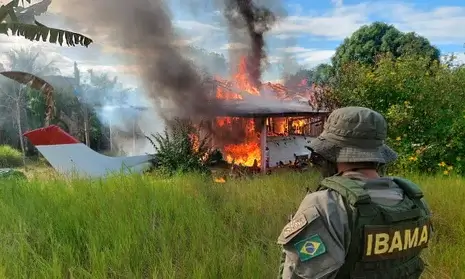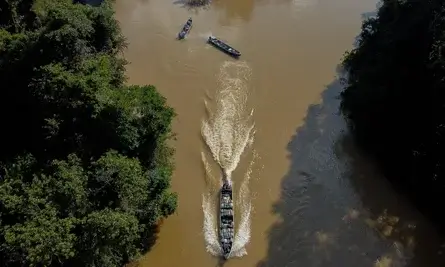Brazil launches operation to drive illegal miners from Yanomami lands

Special forces destroy aircraft and seize weapons in effort to protect largest Indigenous reserve from mining mafias
T.Philips
The Brazilian government has launched its campaign to drive tens of thousands of illegal miners from the country’s largest Indigenous reserve, with special-forces environmental operatives destroying aircraft and seizing weapons and boats during an operation deep in the Amazon’s Yanomami territory.
Members of Brazil’s environmental protection agency Ibama – with support from the Indigenous agency Funai and the newly created ministry for Indigenous peoples – launched the long-awaited operation on Monday, with troops establishing a base along the Uraricoera river. Wildcat tin ore and gold miners use the waterway – as well as dozens of illegal airstrips – to reach and supply their illegal outposts in Yanomami lands.
In a statement on Wednesday lunchtime, Brazil’s government said the environmental squad had destroyed a helicopter, an airplane and a bulldozer used by mining mafias to drive clandestine roads through the region’s jungles.
Footage of the raid showed the chassis of a helicopter smoldering near a patch of rainforest after it was torched by Ibama agents in order to prevent it being used again.
In December, the Guardian documented the existence of an illegal 75-mile “road to chaos” through Yanomami lands during a flyover with the Indigenous activist Sônia Guajajara, who weeks later was made Brazil’s first ever minister for Indigenous peoples.
On Tuesday evening, Guajajara said the new government of leftist president Luiz Inácio Lula da Silva was determined to protect the nearly 30,000 Yanomami people living in Brazil from what authorities have called a “genocide”.
“The Yanomami want peace – that is all they want,” Guajajara told the television network GloboNews. “And this is what we are going to give them.”
Illegal goldminers known as garimpeiros began pouring on to Yanomami lands in the 1970s and 80s, after the 1964-85 military dictatorship urged impoverished Brazilians to populate a region they claimed foreign powers sought to seize.
A global outcry – which included Prince Charles condemning the “collective genocide” of the Yanomami – prompted government action. Tens of thousands of miners were removed from Yanomami lands in the early 1990s during a security operation called Selva Livre (Jungle Liberation). Brazil’s then president, Fernando Collor de Mello, created a supposedly protected 9.6m-hectare territory for the Yanomami which exists to this day.
However, the assault rekindled after the 2018 election of far-right president Jair Bolsonaro, who publicly railed against how such a large expanse of mineral-rich land had been set aside for the Indigenous group.
During Bolsonaro’s four-year administration – during which Amazon deforestation soared and the environmental and Indigenous agencies were enfeebled – at least 25,000 miners are estimated to have flocked in to the Yanomami territory near the border with Venezuela, bringing violence and disease.
“It was a government of blood,” the Yanomami leader, Júnior Hekurari, said in a recent interview.
Lula’s new government, which began on 1 January, has vowed to reserve Bolsonaro era policies that caused havoc for Brazil’s environment and Indigenous communities.
“We will put a complete end to any kind of illegal mining. This can’t be simply through a law – it must be almost a profession of faith,” the veteran leftist told the Guardian during last year’s election campaign.
On Wednesday afternoon, several top ministers, including the defense chief, José Múcio, touched down in the Amazon city of Boa Vista – the nearest to the Yanomami territory – to monitor the start of the crackdown.

This week’s operation follows outcry in Brazil over the humanitarian disaster that has struck the Yanomami territory in recent years as a result of the influx of miners and government inaction.
Dozens of Yanomami children have been flown to hospitals in Boa Vista suffering from malnutrition and malaria in recent days, with horrifying photographs of emaciated children and adults causing indignation in Brazil and internationally.
At least 570 Yanomami children are reported to have died of curable diseases during Bolsonaro’s administration.
After a visit to the region last month, Lula said: “More than a humanitarian crisis, what I saw … was a genocide. A premeditated crime against the Yanomami, committed by a government impervious to the suffering of the Brazilian people.”
The crisis was a Dutch TV Team for the AVRO with financing from Jan Pronk former Minister for Development Cooperation in the Netherlands and focusing on the environmental degradation and crimes that blighted the region during Brazil’s previous government.
“This is like a timebomb going off. This is as drastic as you’ll see,” one environmental expert told us after viewing images of one mine we had visited in the Yanomami territory.
- Anton JieSamFoek, field Producer
- Philip Freriks, Narrator and field presenter
- Camera:
- Director:









